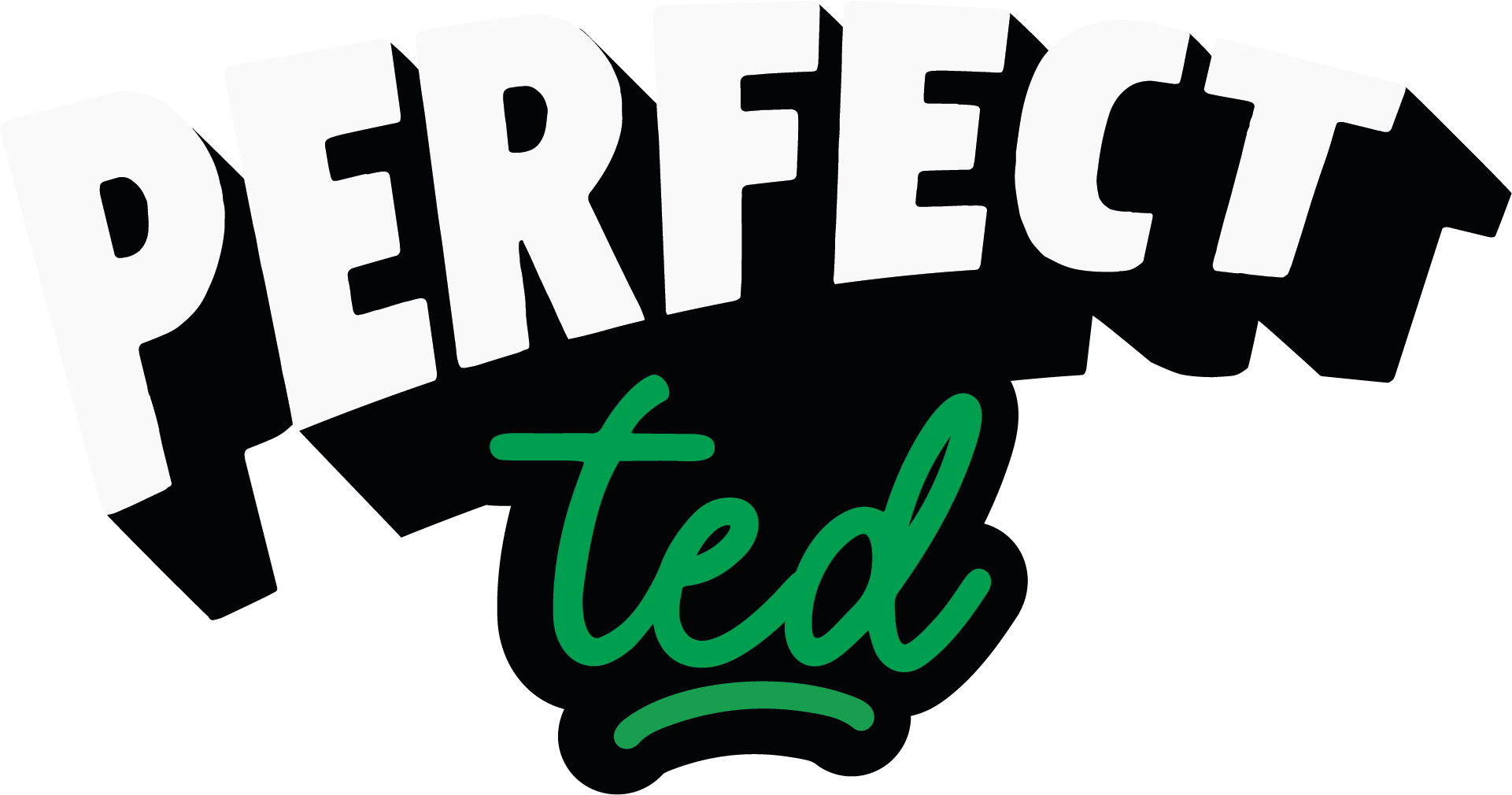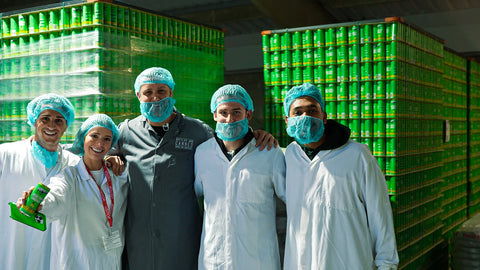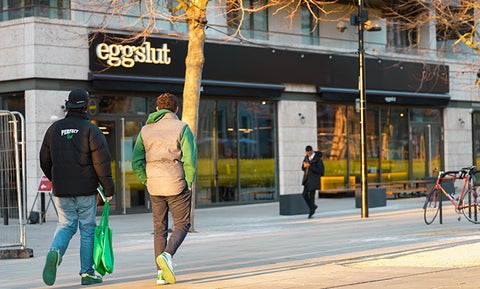What comes to mind when you think of an energy drink?
Is it bright colours?
Or that they’re a bit intense-looking?
Maybe it’s an emergency drink for those tough shifts?
Now you think about it, it doesn’t taste great…
And it actually makes you feel a bit rubbish?
We know, and we sell them! But we made our matcha energy drinks by accident…
Weird, how do you accidentally make an energy drink by accident?
Teddie explains below:
For anyone who doesn’t know, our company was created when Marisa (co-founder) discovered that matcha was able to keep her energised without the negative impacts she experienced with other energy drinks like Red Bull or even coffee.
So, how did we get from that discovery to creating four healthy energy drinks?
We wanted to create a matcha latte in tetra packs (the cartons that oat milk comes in) but due to our manufacturer pausing all new projects during COVID, it forced us to try something different.
Instead of a matcha latte, we experimented with combining our matcha with water and fruit. People loved the flavour, but the most common feedback was how good they felt after drinking it - they felt calm but energised.
So, we shifted to creating an all-natural energy drink.
Researching the industry, it was clear that most energy drink brands weren’t bringing anything new to the table. They were, and still are, taking an existing recipe and attempting to improve it. The problem is that the core ingredients that make a traditional energy drink are the things that also make it “bad” for us.
A lot of energy drinks are trying to come up with synthetic ingredients to aid crashes/side effects, but we prefer our natural one… even though matcha is a notoriously challenging ingredient to work with as it doesn’t fully dissolve in water.
Whilst the energy drinks category can feel quite modern with so many new options coming onto shelves, energy drinks have been around for quite a while:
The Original Energy Drink
Whilst older civilisations have looked to chocolate, coffee, guarana, yerba mate and matcha powder to fuel themselves, the first real modern energy drink, Dr Enuf launched in the US in 1949: a lemon-lime flavoured drink that tackled vitamin deficiencies and boosted energy. With brilliant lines like “Are you just dragging around, have you lost your ambition?” Dr Enuf focused on health, with the drink purporting to provide energy and relieve aches, pains & migraines. However, the drink never really took off, and it wasn’t until 15 years later that the first true modern energy drink came to life…
The mid-19th Century saw Japan introduce laws to combat drug use, notably the 1951 Stimulant Control Law. This opened an opportunity for a retail replacement to illegal stimulants. Taisho Pharmaceuticals developed Lipovitan, sold in medicinal-looking bottles in the 60s to cater to blue-collar workers, containing an ingredient we know well today: taurine. It was marketed heavily toward male workers, demonstrating strength and speed with its eagle logo front and centre, and their TV ads were full of men outdoors displaying physical strength.
Lipovitan became available in Thailand, and it was here that Chaleo Yoovidhya encountered the inspiration for what was to become the precursor to the largest energy drink brand in the world.
Chaleo came from an agricultural family but started working in the pharmaceutical industry and developed the “original” Red Bull: Krating Daeng, literally translating to red guar (a bull-like animal) to cater to Thai workers with labour-intensive jobs.
Austrian marketeer Dietrich Mateschitz (later Red Bull’s founder) first tried the drink as he travelled through Bangkok airport for work. He couldn’t believe how "One glass [of Krating Daeng] and the jet lag was gone" and recognised the massive opportunity for a product like this in Europe. Dietrich went on to sign a partnership with Chaleo to build the brand in the West; a brand that would become the most recognisable energy drink in the world. Red Bull is known for its marketing activity; Dietrich wanted to align Red Bull will fun, athleticism, and crazy sports events like the Red Bull Soap Race.
What followed Red Bull has been a slew of intense, masculine branding, contextualised by extreme activities. Names like Monster, Grenade, C4 and Furocity to name a few, have all tried to replicate such an intensity!
And while it’s aspirational, it’s not practical…
Certainly not known for being tasty,
And not conducive to getting what most of us want out of it: an energy boost that allows us to achieve everything we want in our day.
When we realised, we had a great energy drink, we also really started to see how the drinks that sat beside us on the shelf, didn’t appear to cater to the majority of us, especially women. We want to make sure that anyone who needs a pick-me-up feels represented and seen by PerfectTed.
Energy Drink FAQs
What is an energy drink?
As regulated by the EU, an energy drink is a beverage with more than 150mg of added caffeine per litre.
What is Caffeine?
Caffeine is a stimulant, mostly known for waking us up and making us feel more energetic. At a chemical level, research has demonstrated caffeine's impact on adenosine receptors and melatonin, both of which play a key part in your sleep.
Do energy drinks work?
Well, what do you want? To feel more energised…most likely… but for how long? Energy drinks have an impact on your body, which can range from feeling more awake, to stressed – so really the question is what you want out of it. For Marisa, she wanted to feel a consistent boost of energy without jitters or crashes, which is exactly what our matcha energy drinks offer.
Are energy drinks bad for you?
Not inherently. Energy drinks are regulated in the UK and EU since certain ingredients in them can have negative impacts on your body – like making you feel unwell. Caffeine is a powerful stimulant which is often associated with increased heart rate, feeling breathless and increased stress levels. Additionally, added sugars can also cause blood sugar spikes.
However, not all caffeine sources are the same. Some energy drinks use taurine, coffee beans, guarana, or yerba mate. PerfectTed’s energy source is matcha green tea, which has a rich history, with a reputation for sustaining monks during long days of prayer to samurai during battle. Matcha is packed with l-theanine, which our founder Marisa realised helped her to avoid that jittery feeling.
Many energy drinks contain high levels of caffeine which can cause your heart rate and anxiety to increase, making you feel stressed and unwell. Whilst the impacts are usually temporary, sustained, and frequent use can lead to dependence and even addiction.
How many energy drinks is too much?
Up to 400mg is the recommended amount of caffeine for an adult. An energy drink can contain upward of 80mg per can, so potentially up to 5. However, everybody is different so always be cautious and get in touch with a doctor if you have any concerns at all.
Why do energy drinks make me tired?
Energy drinks can make you “crash”. Energy drinks most commonly use either glucose, caffeine or taurine to increase alertness and wake you up. However, after the impacts have worn off, your body can be left feeling fatigued. PerfectTed doesn’t use any of these.
How much caffeine is in energy drinks?
On average, 80mg for a regular 250ml can. However, larger cans like Spike Hardcore Energy contain 350mg for 450ml, so always ensure you check the can!
Which energy drink is the healthiest?
We designed PerfectTed energy drinks to be the crème de la crème. We only use all-natural ingredients which pack our drinks with functional benefits and sustainable caffeine from matcha green tea.
Sources:
https://www.bangkokpost.com/business/general/808868/red-bull-still-charging-ahead
https://www.tastingtable.com/1357652/first-energy-drink-japan-history/
https://www.britishsoftdrinks.com/position-statements/energy-drinks
https://taisho-th.com/en/about-us/
https://www.ncbi.nlm.nih.gov/pmc/articles/PMC3747933/



